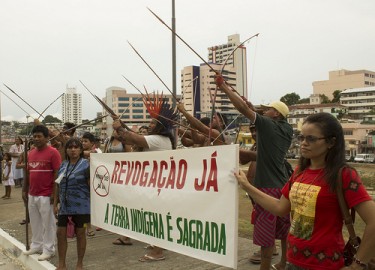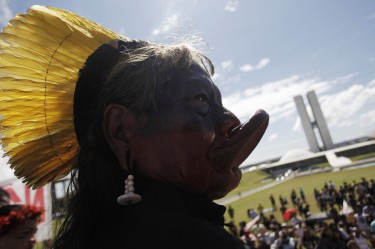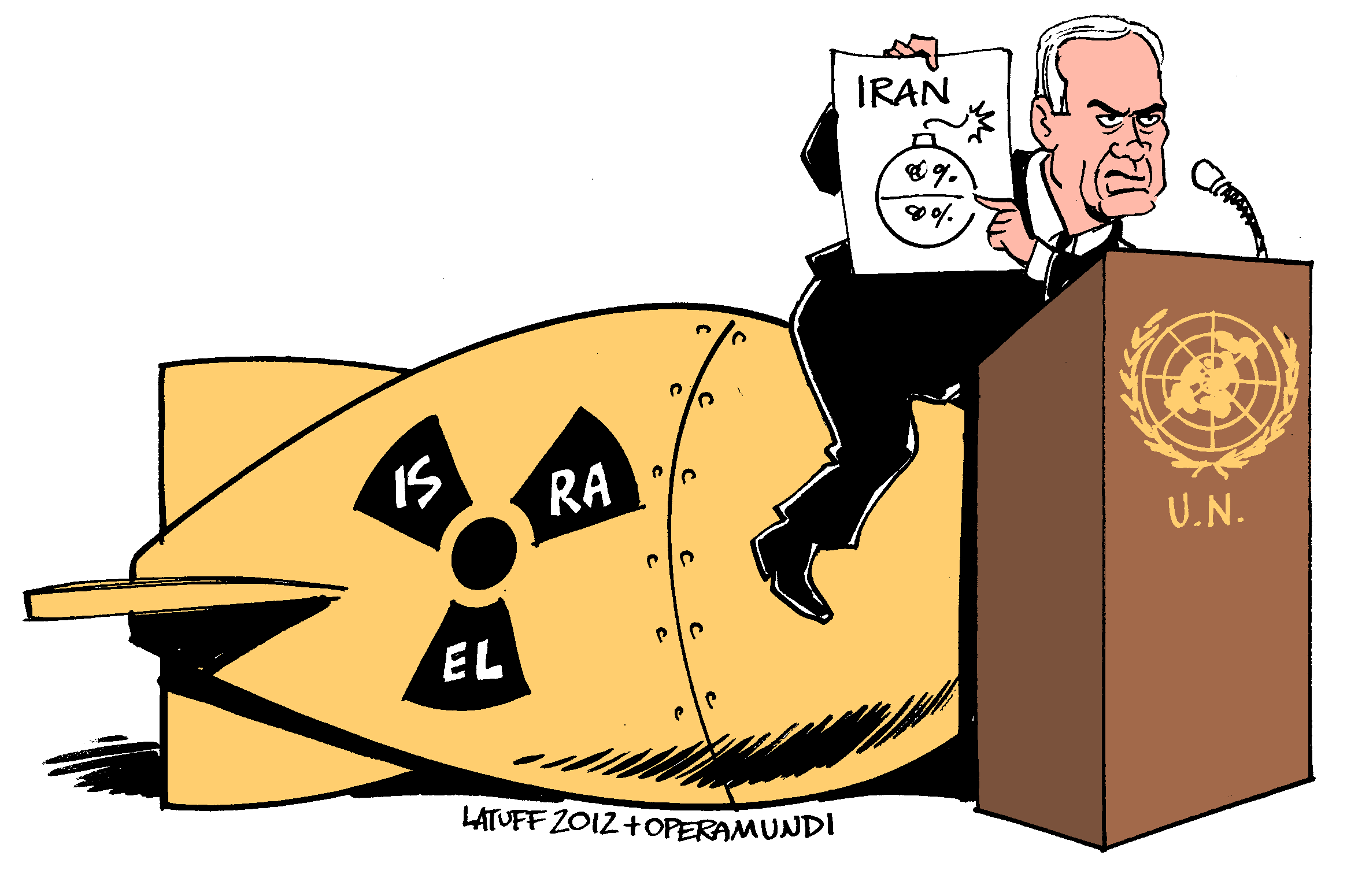Originally posted by Global Voices at http://globalvoicesonline.org/2012/09/12/brazil-threat-to-the-autonomy-of-indigenous-lands/
Em Português este artigo foi originalmente publicado no http://pt.globalvoicesonline.org/2012/09/07/brasil-indigenas-portaria-303/
By/por Sara Moreira

Em Português este artigo foi originalmente publicado no http://pt.globalvoicesonline.org/2012/09/07/brasil-indigenas-portaria-303/
By/por Sara Moreira
Various social movements in Brazil and beyond that fight for the rights of indigenous people [pt] have harshly criticized the issuing of Decree Law 303[pt] in mid-July 2012 by the Brazilian Federal Government via the Office of the Solicitor-General or AGU. The law seeks to restrict the autonomy of indigenous lands in Brazil.
Luana Luizy of the Indigenous Missionary Council (CIMI) summarizes [pt] the implications of the decree:
a Portaria 303 determina, entre outras medidas, que as terras indígenas podem ser ocupadas por unidades, postos e demais intervenções militares, malhas viárias, empreendimentos hidrelétricos e minerais de cunho estratégico, sem consulta aos povos. Por um mero instrumento, a AGU desconstrói o direito constitucional indígena de usufruto exclusivo da terra de ocupação tradicional.
Decree 303 determines, among other measures, that indigenous lands can be occupied by units, posts, and other military inventions, various infrastructure networks, hydroelectric and mining companies of strategic nature, without consultation of the [indigenous] peoples. As a mere instrument, the AGU has dismantleed the constitutional indigenous right of exclusive use of lands traditionally occupied by them.
Those against the measure demand its immediate repeal as they consider it [pt] “an affront to rights guaranteed by the Federal Constitution and by international instruments like ILO Convention 169, a law in the country since 2004, and the Declaration of the UN on the Rights of Indigenous Peoples”.
Indigenous people as obstacles to development
The decree comes at a time when the developmental policies implemented by the government of Dilma Rousseff have visibly collided with the rights of indigenous communities in the country. According to data by IBGE in 2010 there were over 800,000 indigenous Brazilians [pt].
The Belo Monte dam [pt] has been in the media spotlight, as it could be the third largest in the world if it is in fact constructed. According to a report [pt] by Global Voices in August, its construction had in fact been suspended by order of the Public Federal Ministry in the state of Pará due to, among other reasons, lack of consultation of indigenous peoples before the legislative decree that authorized its existence. However, the suspension only lasted a couple of days, as on August 27, the Brazilian Supreme Court decided [pt] in favor of the Solicitor-General, which sought the continuation of construction.
Cases like that of Belo Monte expose the fragility of Brazil regarding its positions on its international human rights commitments, as was seen in 2011 when the Interamerican Commission on Human Rights (ICHR) requested by way of a cautionary measure that the Dilma government immediately suspend construction of the dam.
However, given the influence of the country in the Americas, the very interamerican human rights system is put at risk, believes sociologist Boaventura de Sousa Santos, who has written [pt] about the pressures that the ICHR has unleashed:
O Brasil protesta contra a decisão, retira o seu embaixador na Organização dos Estados Americanos (OEA), suspende o pagamento da sua cota anual à OEA, retira o seu candidato à CIDH e toma a iniciativa de criar um grupo de trabalho para propor a reforma da CIDH no sentido de diminuir os seus poderes de questionar os governos sobre violações de direitos humanos.
Brazil protests the decision, withdraws its ambassador from the Organization of American States (OAS), suspends payment of its annual dues, withdraws its candidate to the ICHR and takes the initiative of creating a working group to propose a reform of the ICHR in order to limit its power to question governments about human rights violations.
Sousa Santos further describes [pt] the line followed by the current “progressive” policies of development in a cutting way:
Os territórios passam a ser terra e as populações que nelas habitam, obstáculos ao desenvolvimento que é necessário remover quanto mais rápido melhor.
The territories become land and the indigenous populations live in them, obstacles to development that must be removed, the sooner the better.
The same line of thought was reinforced by M. Marcos Terena, blogger and indigenous activist, who tweeted on the International Day of Indigenous Peoples, August 9 [pt]:
@MarcosTerena: Nós Indigenas lembramos nesse nosso Dia que a Portaria 303 da AGU ve nas nossas terras, ouro, novas estradas, etc, menos nós os Indignas
We indigenous people remember on this our day that the Decree Law 303 of the Solicitor General sees on our lands gold, new roads, etc, less than it sees us, the indigenous
Zero tolerance
Decree Law 303 has prompted an unparalled unity among various social movements, like the indigenous leader members of the Committee GATI (Indigenous Environmental and Territorial Management), the Indigenous People of Brazil Network (Articulação dos Povos Indígenas do Brasil - APIB), the Indigenist Missionary Council (CIMI) and the National Association of Workers for Funai (the Brazilian government's indigenous affairs institution, Fundação Nacional do índio [pt]).
Their objective has been to raise awareness among lawmakers, the judiciary and Brazilian society, not only on the implications of this measure but also on the various actions underway that they consider “demonstrate a context of dismantling of indigenous policies in the country and an attack on indigenous peoples and their lands”, such as:
o novo decreto de reestruturação da Funai, Decreto 7778/12, as PECs [Propostas de Emenda à Constituição] 038, que daria ao Senado a competência exclusiva para demarcação de terras indígenas e, 215, que transfere essa atividade para o Congresso.
the new decree of the restructure of Funai, Decree 7778/12, the Constitutional Amendments 038, that would give the Senate exclusive competence to demarcate indigenous lands and 215, that transfers this activity to Congress.
More information on these and other measures that work against the rights of indigenous peoples and traditional communities and the environment was shared by the Humanitas Institute UNISINOS on its site [pt]:
@_ihu: Governo Dilma promove a maior cruzada contra os direitos indígenas com trapalhadas jurídicas. http://bit.ly/NiSQjo
The Dilma government promotes a great crusade against indigenous rights with judicial muddling. http://bit.ly/NiSQjo
In response to actions taken in recent weeks, at the end of August the government proposed the suspension of Decree 303 “until the ruling on the suspension of the sentence of the Supreme Court concerning the judicial action related to Raposa Serra do Sol” (Global Voices reported [pt] on this territorial demarcation in 2009) and the “creation of a Working Group composed of the Ministry of Justice, AGU, Funai and representatives of indigenous peoples, with the objective of discussing the conditions established in Decree 303/2012 and other ways of making viable demarcation processes for indigenous lands”.
The Indigenous People of Brazil Network (APIB) expressed its opposition [pt] to the proposed suspension, believing that this will “make latent the widely occurring risks of land conflict in the country” and promises to “keep on mobilizing and fighting for the full repeal of the Solicitor-General's Decree 303″.
----------
A publicação da Portaria 303 em meados de julho de 2012 pelo Governo Federal do Brasil, através da Advocacia Geral da União (AGU, a instituição responsável pelo exercício da advocacia pública a nível federal), visando restringir a autonomia sobre as terras indígenas do Brasil, tem sido duramente repudiada por diversos movimentos sociais que lutam pelos direitos originários dos povos indígenas no país, e além.
a Portaria 303 determina, entre outras medidas, que as terras indígenas podem ser ocupadas por unidades, postos e demais intervenções militares, malhas viárias, empreendimentos hidrelétricos e minerais de cunho estratégico, sem consulta aos povos. Por um mero instrumento, a AGU desconstrói o direito constitucional indígena de usufruto exclusivo da terra de ocupação tradicional.
Opositores à medida exigem a sua imediata revogação já que a consideram “uma afronta aos direitos garantidos pela Constituição Federal e por instrumentos internacionais como a Convenção 169 da OIT [Organização Internacional do Trabalho], que é lei no país desde 2004, e a Declaração da ONU sobre os direitos dos Povos Indígenas”.
Populações como obstáculos ao desenvolvimento
A portaria surge numa altura em que a política de desenvolvimento implementada pelo governo de Dilma Rousseff, tem visivelmente colidido com direitos de comunidades indígenas do país. Segundo dados do IBGE em 2010 foram contabilizados mais de 800 mil indíos no Brasil.
Nos holofotes da mídia tem estado a Usina de Belo Monte, que poderá vir a ser a terceira maior do mundo se a sua construção for de facto concretizada. Conforme o Global Voices reportou em agosto, as obras do complexo hidrelétrico tinham sido suspensas por determinação do Ministério Público Federal no estado do Pará, exatamente por, entre outros motivos, as comunidades indígenas não terem sido consultadas antes do decreto legislativo que autorizou a sua instalação. No entanto, a suspensão das obras apenas durou poucos dias, já que a 27 de agosto o Supremo Tribunal Federal (STF) deferiu a liminar em favor da AGU, que exigia a retoma dos trabalhos.
Casos como o de Belo Monte expõem as fragilidades do Brasil no que toca o seu posicionamento quanto a compromissos internacionais de defesa dos direitos humanos, como se viu quando em 2011 a Comissão Interamericana de Direitos Humanos (CIDH) solicitou ao governo de Dilma, mediante uma medida cautelar, que suspendesse imediatamente a construção da obra.
No entanto, dada a influência do país nas Américas, o próprio sistema interamericano de direitos humanos é posto em risco, acredita o professor catedrático e sociólogo português Boaventura de Sousa Santos, que escreveu sobre o que as pressões da CIDH desencadearam:
O Brasil protesta contra a decisão, retira o seu embaixador na Organização dos Estados Americanos (OEA), suspende o pagamento da sua cota anual à OEA, retira o seu candidato à CIDH e toma a iniciativa de criar um grupo de trabalho para propor a reforma da CIDH no sentido de diminuir os seus poderes de questionar os governos sobre violações de direitos humanos.
Sousa Santos descreve ainda a linha seguida nas atuais políticas “progressistas” de desenvolvimento de forma acutilante:
Os territórios passam a ser terra e as populações que nelas habitam, obstáculos ao desenvolvimento que é necessário remover quanto mais rápido melhor.
A mesma linha de pensamento foi também reforçada por M. Marcos Terena (@MarcosTerena), blogueiro e ativista indígena, que tuitou no Dia Internacional dos Povos Indígenas, 9 de agosto:
Nós Indigenas lembramos nesse nosso Dia que a Portaria 303 da AGU ve nas nossas terras, ouro, novas estradas, etc, menos nós os Indigenas
Tolerância zero

Manifestação indígena contra a portaria 303/12 em Manaus. Foto de Fora do Eixo no Flickr (CC BY-SA).
A Portaria 303 serviu de incentivo à união inédita de diversos movimentos sociais, como as lideranças indígenas membros do Comitê do GATI (Gestão Ambiental e Territorial Indígena), a Articulação dos Povos Indígenas do Brasil (APIB), o Conselho Missionário Indigenista (CIMI) e a Associação Nacional dos Servidores da Funai (Fundação Nacional do índio, Ansef), para tentar sensibilizar parlamentares, judiciário e a sociedade, não só sobre as implicações dessa medida mas também sobre aquilo que consideram ser os vários os atos em curso que “demonstram o contexto de desmonte da política indigenista no país e de ataque às comunidades indígenas e as suas terras”:
o novo decreto de reestruturação da Funai, Decreto 7778/12, as PECs [Propostas de Emenda à Constituição] 038, que daria ao Senado a competência exclusiva para demarcação de terras indígenas e, 215, que transfere essa atividade para o Congresso.
Mais informação sobre essas e outras medidas que vão contra os direitos dos povos indígenas, das comunidades tradicionais e o ambiente, foi partilhada pelo Instituto Humanitas UNISINOS (@_ihu) no seu site:
Governo Dilma promove a maior cruzada contra os direitos indígenas com trapalhadas jurídicas. http://bit.ly/NiSQjo
Em resposta às ações levadas a cabo nas últimas semanas, em finais de agosto o governo propôs a suspensão da Portaria 303 “até o julgamento dos embargos de declaração postos contra a sentença do STF que julgou a ação judicial relativa à Raposa Serra do Sol” (o Global Voices reportou sobre este caso de demarcação territorial em 2009) e “a criação de um Grupo de Trabalho composto pelo Ministério da Justiça, AGU, Funai, e representantes dos povos indígenas, com o objetivo de discutir as condicionantes estabelecidas na Portaria 303/2012 e outras formas de viabilização de processos de demarcação de terras indígenas”.
A APIB mostra-se contrária à proposta de suspensão, por acreditar que esta “manterá latente os riscos de conflitos fundiários generalizados no país” e promete “seguir mobilizando e lutando pela revogação integral da Portaria 303 da AGU”.

